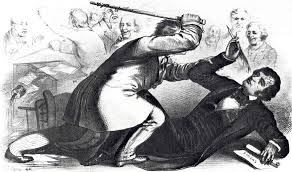Voter fraud settled on the Senate floor
- Laird
- Jan 15, 2018
- 3 min read
Interference in the free-state voting in the Kansas Territory by so-called Ruffians from Missouri inspired Senator Charles Sumner of Massachusetts to present a five-hour speech from memory called The Crime against Kansas. For his trouble he was nearly beaten to death on the floor of the Senate by an angry Southerner.

The hacking of our Presidential election by Russians, or others, affects the basis of our democratic process and deserves the most careful investigation and, at minimum, the development of a plan of mitigation to make sure the sanctity of our ballot box is not compromised in the future.
Today, each news cycle brings the next round of even more dramatic events. Out of self-preservation, yesterday’s outrage starts to look tame. In the case of Russian interference in our electoral process nearly every story has included the saving grace that their efforts did not affect the outcome, further encouraging us to minimize our outrage.
Freshman US Senator Charles Sumner, Republican of Massachusetts, lived in a different time when he took to the Senate floor on May 19, 1856, to elaborate on ballot-tampering and intimidation in the Kansas Territory as voters were deciding whether to have a free-state or slave-state constitution. Sumner called his five-hour speech, filled with classical allusions and oratorical flourishes “The Crime Against Kansas.”
As a consequence of the 1854 Kansas-Nebraska Act two territories were established encompassing all the land ranging from the Oklahoma/Kansas line north to the Canadian border and west to the Rocky Mountains. Local settlers were to determine the status of slavery in the two territories. It was considered a near-certainty that Nebraska would chose free-state status, but Southern Congressmen expected, in turn, Kansas would become a pro-slavery state.
Prior to the 1854 Act there were nearly no white settlers in the Territories. Alarmed that nearby Missourians would create a new slave State, and the Senators and Congressmen who would come with it, New Englanders made a plan to fill Kansas with progressive, abolitionist Yankees, They organized emigration companies to aid those willing to resettle.
Southerners felt Kansas was being stolen from them and organized posses from Missouri, as many as five thousand strong, led by just-retired US Senator David Atchison, to cross over on election days to cast tens of thousands of votes in for the pro-slavery slate. In some cases, the interlopers feigned settlement by driving a few stakes in the ground to claim property, but others just settled for old-fashioned ballot stuffing backed up by loaded six-shooters. Some of the six-shooters went off, initiating the terror that became known as “Bleeding Kansas.”
Senator Sumner’s oration, recited from memory, told about the Crime Against Kansas in eloquent, mind-numbing detail. I wouldn’t encourage a modern reader to wade through all 105 pages, but Sumner did have an eye-opening description of how he and his peers felt about the honor due the voting process in a democracy, compared other nations’ reverence for their royal leadership. He said,
“In countries where royalty is upheld, it is a special offence to rob the crown jewels, which are the emblems of that sovereignty before which the local subject bows, and it is treason to be found in adultery with the Queen, for in this way may a false heir be imposed upon the State; but in our Republic the ballot-box is the single priceless jewel of that sovereignty which we respect, and the electoral franchise, out of which are born the rulers of a free people, is the Queen whom we are to guard against pollution.”
It’s not likely that we’d report today that "adultery with the Queen took place, but not to worry because there were no offspring."
Less comforting is the other consequence of Sumner’s speech. Much of the presentation was inflammatory and insultingly critical of other Senators, among them, South Carolina Democrat Andrew Butler whom he accused of taking “that harlot, Slavery” as his mistress.
Two days later a cousin of Butler found Sumner working alone in the Senate chamber and gave him a near-fatal beating with his cane. This oft-referenced event of incivility cemented partisanship in Congress and is considered, by some, to have hastened the start of the Civil War.
Let us hope that we learn from Senator Sumner’s speech to value the “royalty” of our ballot box and to honor the opinions and integrity of all men and women of good will who have been called to represent Americans in the Nation’s capital.



Truly interesting! Many thanks. Perky Granger